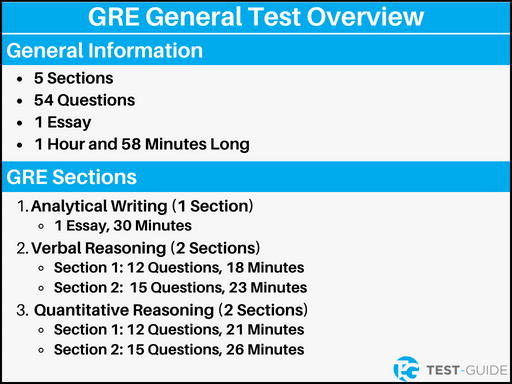The Graduate Record Examinations (GRE) is a standardized admissions test that is used by colleges and universities to help determine admission into their graduate programs.
The GRE is administered by Educational Testing Service (ETS). Starting September 23, 2023, the GRE has been updated to be shorter and more streamlined. Some key featured of the new GRE are:
- Standardized Exam
- 5 Sections
- 1 Hour 58 Minutes
- 54 Questions
- 1 Essay
Learn more about what is on the GRE, a breakdown of each section, how the exam was changed, and more. If you want to start practicing, take our free GRE practice test.
What is on the GRE?
The GRE underwent some huge changes and is now much shorter and more streamlined. These changes went into effect on September 23, 2023.
Here is an overview of the new GRE General Test:
| GRE Section | Number of Questions | Time Limit |
|---|---|---|
| Analytical Writing (1 Section) | One “Analyze an Issue” Essay | 30 Minutes |
| Verbal Reasoning (2 Sections) | Section 1: 12 Questions Section 2: 15 Questions | Section 1: 18 Minutes Section 2: 23 Minutes |
| Quantitative Reasoning (2 Sections) | Section 1: 12 Questions Section 2: 15 Questions | Section 1: 21 Minutes Section 2: 26 Minutes |
The GRE is a section level adaptive test. This means that the first section you take will be of average difficulty. The difficulty of the second section will depend on how you did on the first section.
Here is information from the official GRE site.
GRE Sections
On the new GRE exam, there will be 5 total sections:
- Analytical Writing
- Verbal Reasoning (Section 1)
- Verbal Reasoning (Section 2)
- Quantitative Reasoning (Section 1)
- Quantitative Reasoning (Section 2)
The analytical writing section will always be given first. After that, the other four sections may appear in any order.
We will review each section in detail below.
Analytical Writing
| Number of Questions | Time Limit (Minutes) | Score Range |
|---|---|---|
| 1 Essay | 30 Minutes | 0-6 |
The analytical writing section will be the first section given on the GRE exam. You will be given an opinion on an issue and will be asked to respond to the issue. You will have 30 minutes to complete your essay.
This section will not require you to know any specific content knowledge. You will be tested on your ability to:
- Create Arguments
- Support Your Arguments and Ideas
- Keep a Focused Discussion
You will be typing your essay response. You will not have access to spellcheck or a grammar checker.
Verbal Reasoning
| Number of Questions | Time Limit (Minutes) | Score Range |
|---|---|---|
| Section 1: 12 Questions | 18 Minutes | 130-170 |
| Section 2: 15 Questions | 23 Minutes |
The verbal reasoning section is split into two sections. There will be 27 total questions between both sections. Both sections contain the same three types of questions:
- Text Completion: ~7 Questions
- Sentence Equivalence: ~6 Questions
- Reading Comprehension: ~14 Questions
Text Completion questions will be made up of one to five sentences with one to three blanks per sentence. You will be required to fill in the blank to complete the sentences.
Sentence Equivalence questions will be made up of a single sentence with one blank and six answer choices. You will need to select two answer choices.
Reading Comprehension questions will consist of a passage and questions associated with that passage. Each passage can have anywhere from one to six questions associated with it. Passages can be adapted from numerous topics like physical sciences, biological sciences, social sciences, business, arts and humanities, and everyday topics.
The verbal reasoning portion of the GRE is section adaptive. This means that the first section will be average difficulty level. The difficulty of the second section will depend on how you did on the first section.
Take our GRE practice test to prepare for this section.
Quantitative Reasoning
| Number of Questions | Time Limit (Minutes) | Score Range |
|---|---|---|
| Section 1: 12 Questions | 21 Minutes | 130-170 |
| Section 2: 15 Questions | 26 Minutes |
The quantitative reasoning section is split into two sections. There will be 27 total questions between both sections. Both sections contain the same three types of questions:
- Quantitative Comparison: ~10 Questions
- Problem-Solving: ~13 Questions
- Data Interpretations: ~4 Questions
Quantitative Comparison questions will ask you to compare two quantities. You will be asked to choose a statement that best describes the quantities (quantity A is greater, quantity B is greater, they are equal, the relationship cannot be determined).
Problem-Solving questions have a couple of different variations. Those variations include multiple-choice questions (select one & select one or more) and numeric entry questions. Numeric entry questions will require you to enter your answer in a box.
Data Interpretations questions will be grouped together and reference the same table, graph, or similar data set. You will be asked to interpret the data and answer multiple-choice or numeric entry questions.
The quantitative reasoning portion of the GRE is section adaptive. This means that the first section will be average difficulty level. The difficulty of the second section will depend on how you did on the first section.
You can prepare for this section by using our free GRE practice questions.

How Long is the GRE?
The GRE is 1 hour and 58 minutes long. The exam used to be 3 hours and 45 minutes long, but was made shorter and more streamlined in September 2023.
The new version of the GRE does not have any scheduled breaks. You will sit down, take the whole exam, and be done.
Scoring of the GRE
The GRE is scored by section, with each section being scaled slightly differently:
- Analytical Writing: 0-6
- Verbal Reasoning: 130-170
- Quantitative Reasoning: 130-170
You will receive a raw score (number of questions answered correctly) for verbal reasoning and quantitative reasoning. Your raw score will then be converted to a scaled score (130-170). The scaled score takes into account the question difficulty.
The analytical writing section will be scored by both a computer and a trained human analyst.
You will not receive an overall total score since each section is scored separately. For more information on scores and what a good score is, read our guide to GRE scores.
Registration, Scheduling, and Fees for the GRE
Registration for the GRE is fairly straightforward. You can follow these steps:
- Create an ETS Account
- Choose Your Test Date and Location
- Confirm Your Information
- Pay the Fees
The standard fee for the GRE is $220. There may be some other fees associated with the exam like rescheduling fees, scoring service fees, etc…
When scheduling your exam, you will have 2 options when it comes to taking the exam:
- Online: Take the exam online with a remote proctor.
- Testing Center: Take the exam at one of the 1,000+ testing centers.
If you decide to take the exam online, you will need to make sure your equipment and environment meet the minimum requirements.
The exam is given year-round. There is not a specific set of dates in which the exam is only given. You will be able to take the GRE once every 21 days, and up to five times in a 12-month period.
Preparing for Your GRE
The GRE is a very stressful exam, especially when you factor in the implications and how it can affect your application to graduate programs.
We suggest starting off with our free GRE prep. These exams will help you get a feel for where you stand and what sections you need to study for.
Frequently Asked Questions
Is the GRE multiple-choice?
Most questions on the GRE will be multiple-choice. However, there are some questions that require you to write in your answer (numeric entry). There is also an essay question.
How many sections are there on the GRE?
The GRE has 5 total sections:
- Analytical Writing
- Verbal Reasoning (2)
- Quantitative Reasoning (2)
Analytical writing will be given first. After that, the other 4 sections can be administered in any order.
How many questions are on the GRE?
There will be 54 questions and 1 essay. These questions are spread out amongst the 5 sections.
How long is the GRE?
The new GRE has been streamlined to be 1 hour and 58 minutes long.
How do you take the GRE?
You can take the GRE in 1 of 2 ways:
- Online
- Testing Center
The choice is completely up to you.
Is the GRE computer adaptive?
The GRE is computer adaptive, but on a section level.
This means that the first section of verbal and quantitative reasoning will be average difficulty. The second section for verbal and quantitative reasoning will be harder or easier, depending on how you did on the first section.
What is the GRE retake policy?
You can retake the GRE once every 21 days. You are allowed to take the exam a total of 5 times in a 12-month period.

